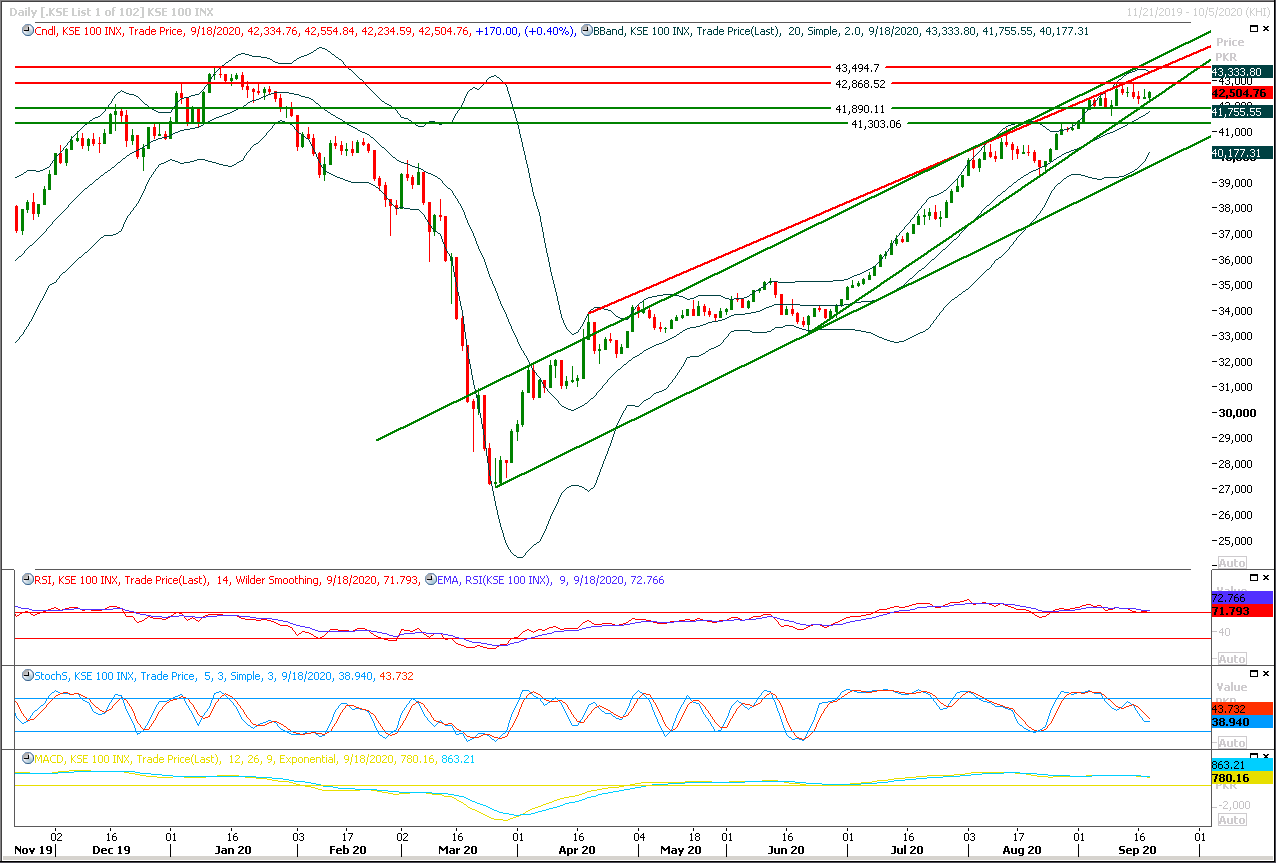Technical Overview
The Benchmark KSE100 index have succeeded in bouncing back after getting support from supportive trend line of its rising wedge during last trading session, but it's still caged in an uncertain region because there are still chances that it may face rejection from its previous top. Mean while it's also being capped by a strong horizontal resistance at 42,900pts which would try to push index downward in case of bullish spike and it would remain in range bound situation until it would not succeed in closing above 43,000pts on daily chart. While on flip side in case of rejection from its resistant regions index would try to find ground at 42,200pts and 42,000pts in case of bearish breakout below 41,900pts index would enter into corrective zone of its previous bearish rally. While penetration below that region would gave a bearish breakout of its rising wedge which would change investor sentiment as well.

Regional Markets
Asian shares cling to tight ranges as attention shifts to U.S. election, stimulus
Asian shares and most currencies held tight ranges on Monday, as investors awaited developments on U.S. fiscal stimulus and coronavirus vaccines amid a resurgence of infections in Europe.MSCI’s broadest index of Asia-Pacific shares outside Japan was 0.1% weaker, though it was not too far from a June 2018 peak at 568.84. Australia's .AXJO benchmark index slipped 0.5% while New Zealand's .NZ50 stumbled 0.6%. Chinese shares opened in the red with the blue-chip index .CSI300 down 0.3%. “While the economic recovery continues, momentum is clearly slowing,” Kathy Bostjancic, chief U.S. financial economist at Oxford Economics wrote in a note. “The second phase of the recovery will likely be bumpy and fraught with pitfalls,” Bostjancic added.
Read More...
Business News
Hydropower producers resisting tariff cut
As the government struggles to translate memorandums of understanding (MOUs) signed with the Independent Power Producers (IPPs) of thermal and renewable power plants for tariff discounts into contracts, sponsors of hydropower power plants (HPPs) have declined to revise old agreements with the government. A senior government official told Dawn that sponsors of HPPs had three to four sessions with the IPPs negotiations committee led by former federal secretary Babar Yaqoob and comprising members of stakeholders and agencies appointed by the government to negotiate power contracts. However, nothing had been finalised yet, he said. Sources close to HPPs confirmed “they refused to sign MOUs prepared by the negotiation committee
Read More...
Businessmen seek cut in production cost for survival of industry
The Friends of Economic & Business Reforms (FEBR) President Kashif Anwar has recommended the government to take serious steps for bringing down cost of production, which is very high due to constant rupee depreciation, rising power tariffs, costly fuel and escalating import duties on inputs. In a statement issued here on Sunday, Kashif Anwar, who is also former vice president of LCCI, observed that the government will have to make visible reduction in taxes to help revive the businesses in post-corona economic strategy. He said that like the domestic industry COVID-19 crisis has also forced the global investors to put their new investment plans on hold. He said that there is no visible improvement in employment even after the business activities were allowed and countrywide lockdown eased.
Read More...
After day-long huddle, Pakistan Democratic Movement demands PM Imran's 'immediate' resignation
After hours of discussion over ways to overthrow the "selected" government, opposition parties at the much-hyped PPP-hosted multiparty conference on Sunday demanded the "immediate" resignation of Prime Minister Imran Khan. According to a 26-point resolution passed by the multiparty conference, the forum is named Pakistan Democratic Movement (PDM) — an "alliance structure which will lead and guide nationwide protests against the anti-public and anti-nation government in a disciplined and integrated manner". The resolution, read out by JUI-F chief Maulana Fazlur Rehman at a press conference held after multiparty conference late on Sunday evening, stated that the current government has been granted "fake stability by the same establishment" that interfered with the elections to bring the incumbent rulers to power.
Read More...
36pc return filers paid zero tax in 2018
Of the total 2.743 million individual taxpayers, around 1.004m or 36.6 per cent taxpayers paid no income tax in the tax year 2018, the Federal Board of Revenue (FBR) data showed. Even though all of these individuals filed their income tax returns, they fall under the non-tax bracket where their declared annual incomes are less than Rs400,000. In the case of association of persons (AOPs) 29,480 or 45.82pc are return filers, but paid zero income tax as their declared incomes fell below the taxable limit. Moreover, an interesting is the fact that this particular tax bracket has gained many new entrants over the past years to skip higher tax rates applicable on non-filers. The government introduced the tool to encourage documentation of the economy, but it has encouraged nil or junk filers. In the first three taxable brackets, around 1.296m or 47pc taxpayers file their income tax returns.
Read More...


0 Comments
No comments yet. Be the first to comment!
Please log in to leave a comment.